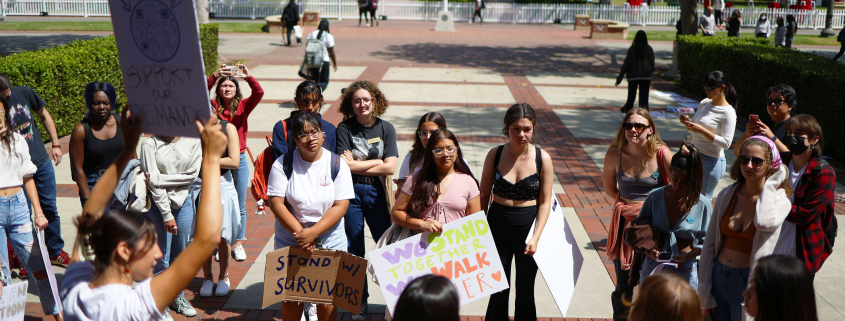Students walk out for Denim Day
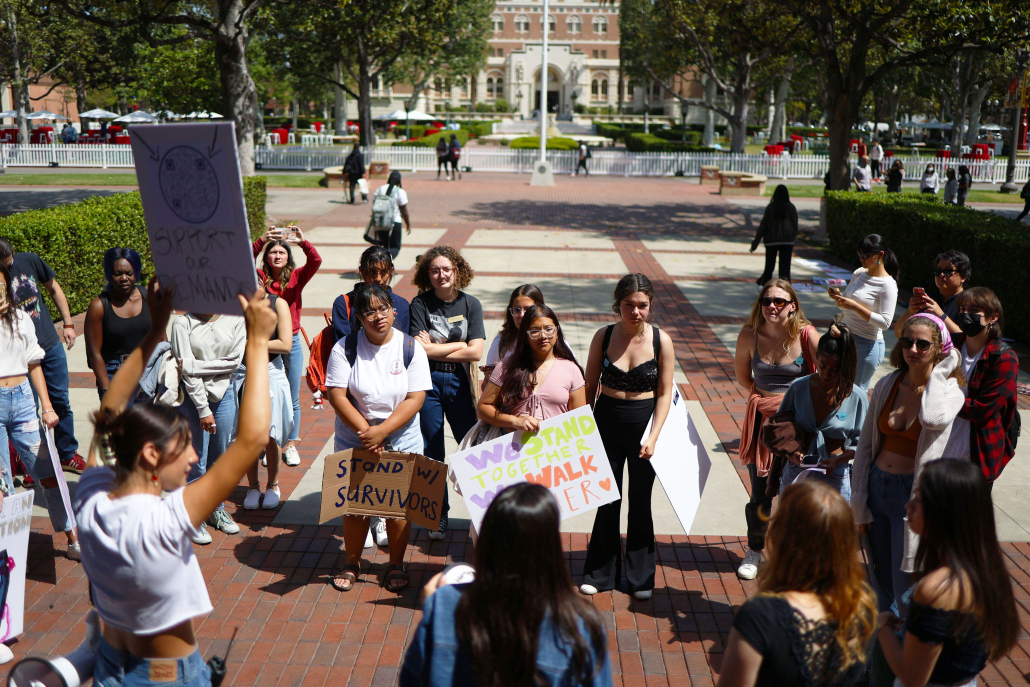
Content warning: This article contains references to sexual violence.
The Student Assembly for Gender Empowerment, USC Flow, Survivor Support Community, Callisto and Promoting Awareness, Victim Empowerment joined Explain the Asterisk’s nationwide campaign for a campuswide walkout against sexual violence at USC in commemoration of Denim Day. Students demanded accountability, transparency and concrete action against rape culture at the University during Wednesday’s walkout.
Denim Day has been celebrated on the last Wednesday of April for the past 23 years in solidarity with sexual assault victims. In 1998, the Italian Supreme Court overturned a rape conviction, ruling that because the victim’s jeans were too tight, she must have helped remove them, indicating consent. The next day, the women of the Italian Parliament wore jeans to work in support of the victim.
Starting in front of Bovard Auditorium, students marched to USC Village before making their way to 28th St. to sit on the lawn of the Delta Tau Delta fraternity house — which is currently on interim suspension for assault allegations. There, representatives of USC Flow and SSC led discussions on the Interfraternity Council’s accountability.
“We are here today because for far too long, the pervasive problem of sexual assault at USC has gone on unobstructed and enabled by systemic inaction and violence,” SSC president Sammie Sorsby-Jones said. “We are here today to bring dialogue to where there was once silence, to bring light to what has been shrouded in darkness for far too long. We are here today to make lasting change because we all deserve so much better.”
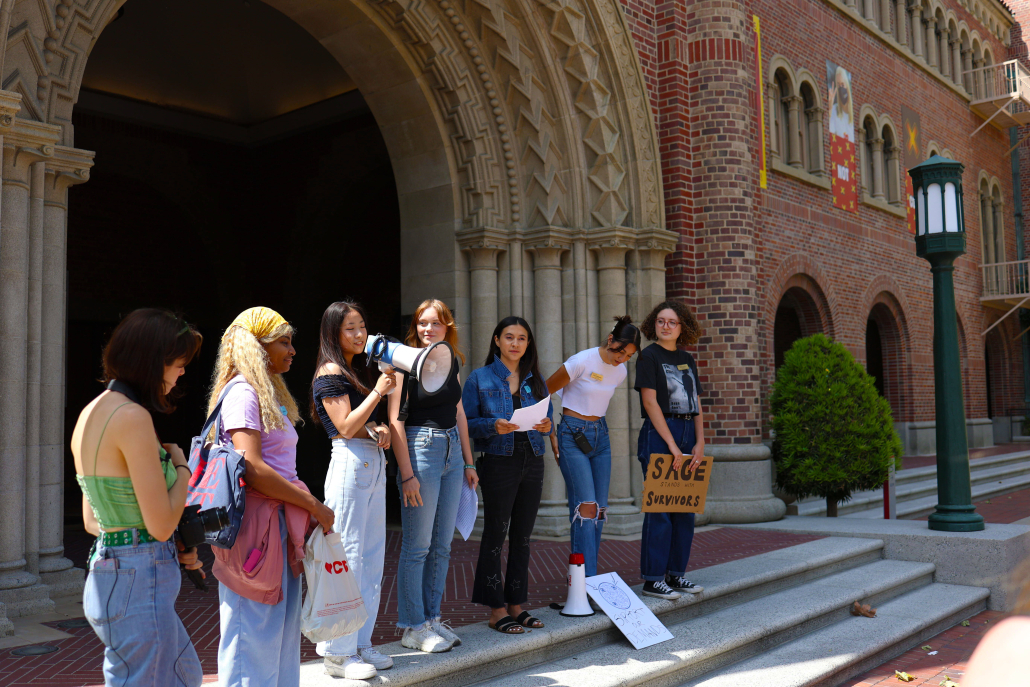
The walk’s participating organizations published their list of demands earlier this week for University administration, the Interfraternity and Panhellenic Councils, Department of Public Safety, faculty, staff and students. Demands focused on greater transparency and accountability in response to sexual assault allegations, increasing the number of professionals trained in dealing with trauma victims and mandatory in-person sexual harassment and bystander intervention training for all students.
“We have yet to receive what will change in regards to safety from sexual violence for students,” USC Flow cofounder and president Natalia Parraz said. “This begins with not only the structure of the university, but what behavior students decide is okay and what’s not okay. That’s why our demands are targeted not only at Title IX and the administration, but at IFC and the student body. Nothing will change unless [we] decide it’s gonna change.”
Part of the organizations’ administrative demands include greater accessibility to the resources the University has for sexual assault survivors. Sorsby-Jones described the process of seeking help from the University as “bureaucratic” because resources are hard to find, which adds a layer of difficulty to survivors’ healing processes as they have to relay their trauma to multiple offices.
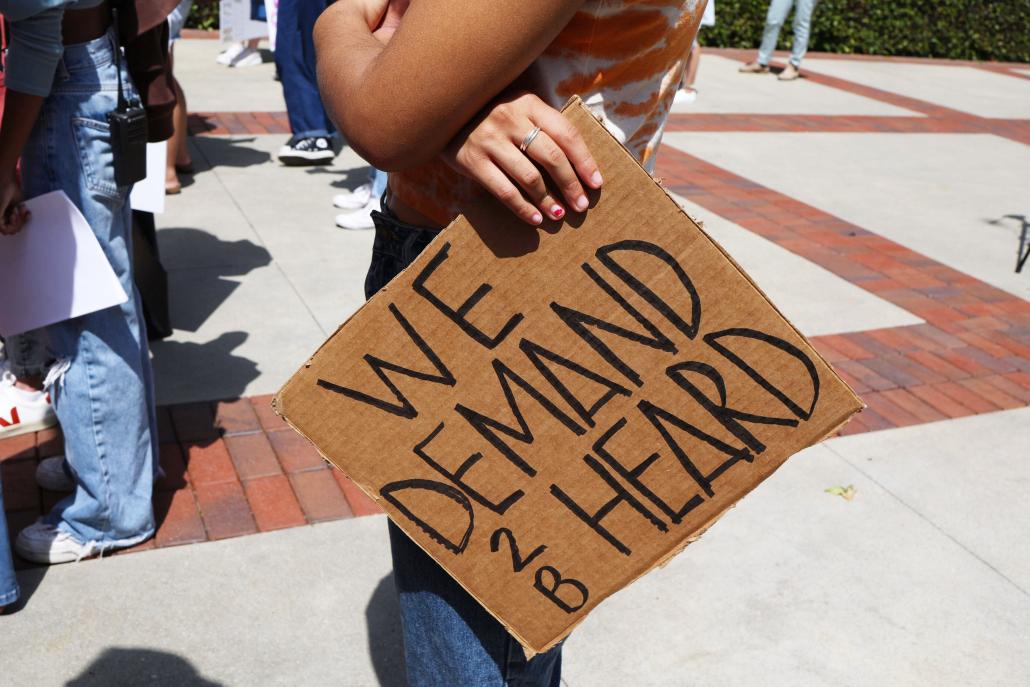
“It’s unreasonable to expect survivors to be able to endure that on top of everything they’ve already endured,” Sorsby-Jones said. “We should be doing everything that we can to hold the perpetrators accountable, not at the cost of the survivor.”
Elle de los Reyes, a representative for PAVE, said some services, such as Relationship & Sexual Violence Prevention, must be more trauma-informed. After she had a strong reaction regarding difficult decisions in her case, RSVP staff advised her to calm down because otherwise she would no longer be provided services.
“We can’t be expected to just take [bad news] without any sort of reaction, and there needs to be more understanding,” de los Reyes said.
Referencing last October’s protests demanding justice after multiple reports of sexual harassment and drugging occurred at the Sigma Nu Fraternity house, students emphasized the importance of consistently demanding University action instead of stopping once the topic is no longer popular. Students also brought attention to the importance of fellow students showing solidarity toward victims. This includes not associating with known abusers, not being a bystander when violence is taking place and speaking out if an act of violence is committed.
“We watched as weeks passed and the brief campus reckoning abated and then things went back to normal,” said SSC vice president Yi-Ann Li. “The topic of sexual assault at USC stopped being trendy. The truth is there is no ‘back to normal’ for survivors. Our pain is not a trend or a brief stop of a performative action.”
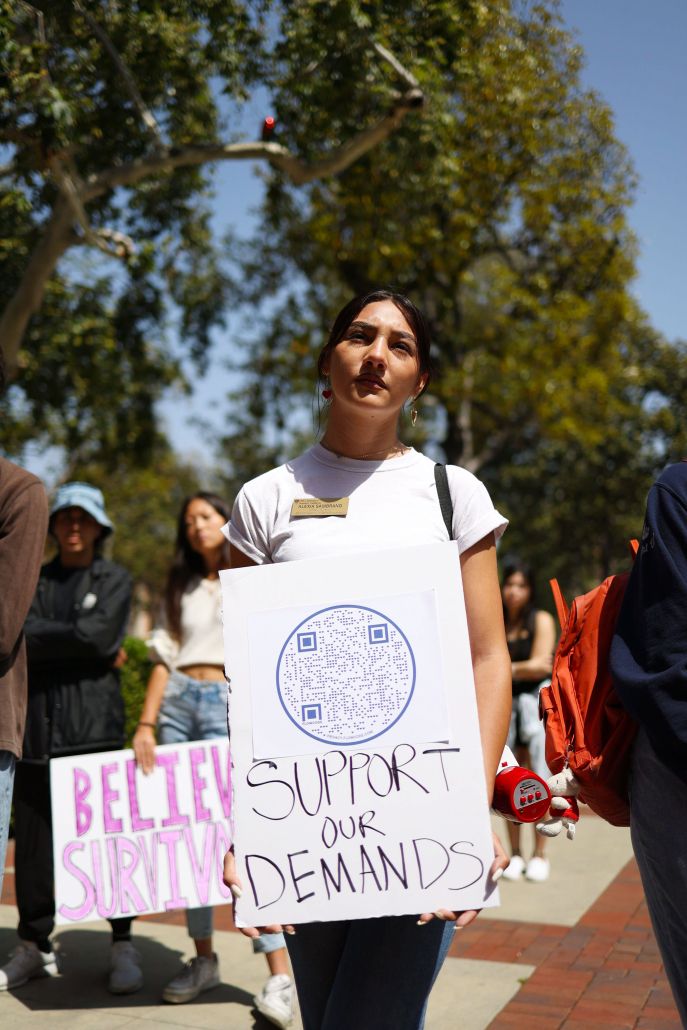
Portions of the walkout were filmed for a documentary by Nice for What Movement, an organization that focuses on ensuring accountability by encouraging sexual violence survivors to share their stories. The documentary, funded by USC Visions and Voices, has been filming since the October protest and has included other Sexual Assault Awareness Month events hosted by the University.
“The goal is to hold USC [administration] accountable for what they’ve put survivors through during our time here at school and to hopefully inspire change and also emphasize the intersection between healing and advocacy that a lot of survivors have found themselves in,” de los Reyes said.
Ultimately, students want to see an end to the culture of protection that the University has with fraternities, aggressors and staff. Even when victims report their abuse, they may have issues with Title IX staff which are then usually ignored, Sorsby-Jones said.
“When I really think about it, there’s plenty of solidarity, just not with survivors,” Sorsby-Jones said.

